|

On eBay Now...
Poet Writer John Greenleaf Whittier Home Cabinet Card Photograph Amesbury MA For Sale

When you click on links to various merchants on this site and make a purchase, this can result in this site earning a commission. Affiliate programs and affiliations include, but are not limited to, the eBay Partner Network.

Poet Writer John Greenleaf Whittier Home Cabinet Card Photograph Amesbury MA:
$29.95
Poet Writer John Greenleaf Whittier Home Cabinet Card Photograph Amesbury MA a.imagelink {color:#0000FF;} a:hover.imagelink {color:#0000FF;} a:visited.imagelink {color:#800080;} a.imagelink img.saleimage { border: 2px solid #0000FF; } a:visited.imagelink img.saleimage { border: 2px solid #800080; } Rare Antique c 1880's-1890's Poet Writer John Greenleaf Whittier Home Cabinet Card Photograph
Amesbury, Massachusetts
Original Photograph
Home were the Abolitionist wrote most of his works.
John Greenleaf Whittier (December 17, 1807 – September 7, 1892) was an American Quaker poet and advocate of the abolition of slavery in the United States. Frequently listed as one of the Fireside Poets, he was influenced by the Scottish poet Robert Burns. Whittier is remembered particularly for his anti-slavery writings as well as his book Snow-Bound. John Greenleaf Whittier was born to John and Abigail (Hussey) at their rural homestead in Haverhill, Massachusetts, on December 17, 1807.[1] His middle name is thought to mean 'feuillevert' after his Huguenot forebears.[2] He grew up on the farm in a household with his parents, a brother and two sisters, a maternal aunt and paternal uncle, and a constant flow of visitors and hired hands for the farm. As a boy, it was discovered that Whittier was color-blind when he was unable to see a difference between ripe and unripe strawberries.[3] Their farm was not very profitable and there was only enough money to get by. Whittier himself was not cut out for hard farm labor and suffered from bad health and physical frailty his whole life. Although he received little formal education, he was an avid reader who studied his father's six books on Quakerism until their teachings became the foundation of his ideology. Whittier was heavily influenced by the doctrines of his religion, particularly its stress on humanitarianism, compassion, and social responsibility. Whittier was first introduced to poetry by a teacher. His sister sent his first poem, "The Exile's Departure", to the Newburyport Free Press without his permission and its editor, William Lloyd Garrison, published it on June 8, 1826.[4] Garrison as well as another local editor encouraged Whittier to attend the recently opened Haverhill Academy. To raise money to attend the school, Whittier became a shoemaker for a time, and a deal was made to pay part of his tuition with food from the family farm.[5] Before his second term, he earned money to cover tuition by serving as a teacher in a one-room schoolhouse in what is now Merrimac, Massachusetts.[6] He attended Haverhill Academy from 1827 to 1828 and completed a high school education in only two terms. Garrison gave Whittier the job of editor of the National Philanthropist, a Boston-based temperance weekly. Shortly after a change in management, Garrison reassigned him as editor of the weekly American Manufacturer in Boston.[7] Whittier became an out-spoken critic of President Andrew Jackson, and by 1830 was editor of the prominent New England Weekly Review in Hartford, Connecticut, the most influential Whig journal in New England. In 1833 he published The Song of the Vermonters, 1779, which he had anonymously inserted in The New England Magazine. The poem was erroneously attributed to Ethan Allen for nearly sixty years. During the 1830s, Whittier became interested in politics but, after losing a Congressional election at age twenty-five, he suffered a nervous breakdown and returned home. The year 1833 was a turning point for Whittier; he resurrected his correspondence with Garrison, and the passionate abolitionist began to encourage the young Quaker to join his cause. In 1833, Whittier published the antislavery pamphlet Justice and Expediency,[8] and from there dedicated the next twenty years of his life to the abolitionist cause. The controversial pamphlet destroyed all of his political hopes — as his demand for immediate emancipation alienated both northern businessmen and southern slaveholders — but it also sealed his commitment to a cause that he deemed morally correct and socially necessary. He was a founding member of the American Anti-Slavery Society and signed the Anti-Slavery Declaration of 1833, which he often considered the most significant action of his life. Whittier's political skill made him useful as a lobbyist, and his willingness to badger anti-slavery congressional leaders into joining the abolitionist cause was invaluable. From 1835 to 1838, he traveled widely in the North, attending conventions, securing votes, speaking to the public, and lobbying politicians. As he did so, Whittier received his fair share of violent responses, being several times mobbed, stoned, and run out of town. From 1838 to 1840, he was editor of The Pennsylvania Freeman in Philadelphia,[9] one of the leading antislavery papers in the North, formerly known as the National Enquirer. In May 1838, the publication moved its offices to the newly opened Pennsylvania Hall on North Sixth Street, which was shortly after burned by a pro-slavery mob.[10] Whittier also continued to write poetry and nearly all of his poems in this period dealt with the problem of slavery. By the end of the 1830s, the unity of the abolitionist movement had begun to fracture. Whittier stuck to his belief that moral action apart from political effort was futile. He knew that success required legislative change, not merely moral suasion. This opinion alone engendered a bitter split from Garrison,[citation needed] and Whittier went on to become a founding member of the Liberty Party in 1839.[9] In 1840 he attended the World Anti-Slavery Convention in London.[11] By 1843, he was announcing the triumph of the fledgling party: "Liberty party is no longer an experiment. It is vigorous reality, exerting... a powerful influence".[12] Whittier also unsuccessfully encouraged Ralph Waldo Emerson and Henry Wadsworth Longfellow to join the party.[13] He took editing jobs with the Middlesex Standard in Lowell, Massachusetts, and the Essex Transcript in Amesbury until 1844.[9] While in Lowell, he met Lucy Larcom, who became a lifelong friend.[14] In 1845, he began writing his essay "The Black Man" which included an anecdote about John Fountain, a free black who was jailed in Virginia for helping slaves escape. After his release, Fountain went on a speaking tour and thanked Whittier for writing his story.[15] Around this time, the stresses of editorial duties, worsening health, and dangerous mob violence caused him to have a physical breakdown. Whittier went home to Amesbury, and remained there for the rest of his life, ending his active participation in abolition. Even so, he continued to believe that the best way to gain abolitionist support was to broaden the Liberty Party's political appeal, and Whittier persisted in advocating the addition of other issues to their platform. He eventually participated in the evolution of the Liberty Party into the Free Soil Party, and some say his greatest political feat was convincing Charles Sumner to run on the Free-Soil ticket for the U.S. Senate in 1850. Beginning in 1847, Whittier was editor of Gamaliel Bailey's The National Era,[9] one of the most influential abolitionist newspapers in the North. For the next ten years it featured the best of his writing, both as prose and poetry. Being confined to his home and away from the action offered Whittier a chance to write better abolitionist poetry; he was even poet laureate for his party. Whittier's poems often used slavery to represent all kinds of oppression (physical, spiritual, economic), and his poems stirred up popular response because they appealed to feelings rather than logic. Whittier produced two collections of antislavery poetry: Poems Written during the Progress of the Abolition Question in the United States, between 1830 and 1838 and Voices of Freedom (1846). He was an elector in the presidential election of 1860 and of 1864, voting for Abraham Lincoln both times.[16] The passage of the Thirteenth Amendment in 1865 ended both slavery and his public cause, so Whittier turned to other forms of poetry for the remainder of his life. Whittier was one of the founding contributors of the magazine Atlantic Monthly. One of his most enduring works, Snow-Bound, was first published in 1866. Whittier was surprised by its financial success; he earned $10,000 from the first edition.[17] In 1867, Whittier asked James Thomas Fields to get him a ticket to a reading by Charles Dickens during the British author's visit to the United States. After the event, Whittier wrote a letter describing his experience: "My eyes ached all next day from the intensity of my gazing. I do not think his voice naturally particularly fine, but he uses it with great effect. He has wonderful dramatic power... I like him better than any public reader I have ever before heard."[18] Whittier spent the last few winters of his life, from 1876 to 1892, at Oak Knoll, the home of his cousins in Danvers, Massachusetts.[19] Whittier spent the summer of 1892 at the home of a cousin in Hampton Falls, New Hampshire, where he wrote his last poem (a tribute to Oliver Wendell Holmes, Sr.) and where he was captured in a final photograph.[20]He died at this home on September 7, 1892,[21] and was buried in Amesbury, Massachusetts.
Reference: Wikipedia 2017
BN1
We sell mostly vintage, antique, used and unique items. Expect minor evidence of use or imperfections, dings etc. from age. We take photos of our items to help with the description as every detail may not be caught. Please use the photos to help judge content and condition. If you are unsure in any way please ask.
Please check out our other sales, we combine shipping! Shipping includes Delivery Confirmation~ THANKS AND GOD BLESS! 
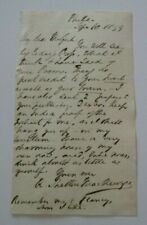
ROBERT SHELTON MACKENZIE SIGNED AUTOGRAPHED LETTER ANTIQUE IRISH POET WRITER $360.00
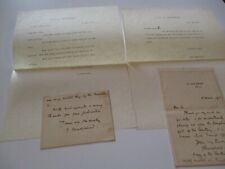
John Edward Masefield English poet writer LETTER AUTOGRAPH ANTIQUE Poet Laureate $360.00

ANNE GRANT SIGNED AUTOGRAPH LETTER FAMOUS SCOTTISH POET WRITER ANTIQUE RARE $315.00

Vintage Walt Whitman Writer Poet Label $18.75
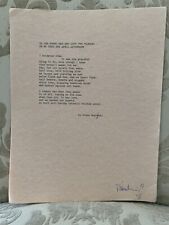
Diane Wakoski American Poet Author Signed Poem Autographed New $15.00

Barbara Howes American Poet Author Signed Poem "Among Shells" Autographed $15.00
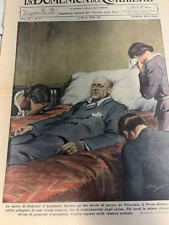
1938 Death of the Poet Writer Aviator War Hero Gabriele D'Annunzio CAMPARI C7-4 $39.90
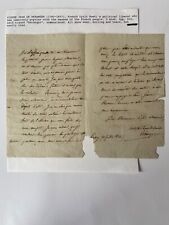
Pierre-Jean de Beranger-French Poet and Song Writer- Signed Letter -Dated 1832 $175.00
|